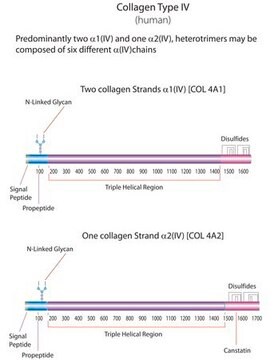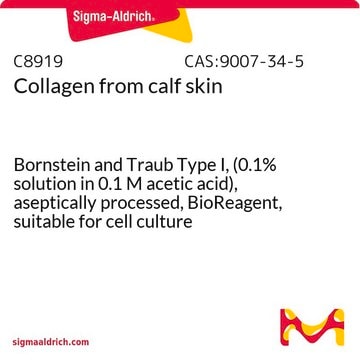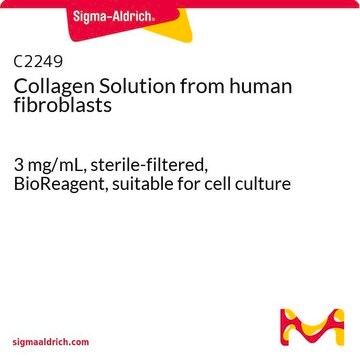C5533
Human Collagen Type IV
from human placenta, powder, suitable for cell culture
Synonym(s):
Collagen Type 4
About This Item
Recommended Products
product name
Collagen from human placenta, Bornstein and Traub Type IV, powder, BioReagent, suitable for cell culture
biological source
human placenta
Quality Level
product line
BioReagent
form
powder
packaging
pkg of 5 mg
technique(s)
cell culture | mammalian: suitable
impurities
HIV, hepatitis B and hepatitis C, none detected
solubility
acetic acid: 0.5-2.0 mg/mL (Dissolve for several hours at 2-8 °C, occasionally swirling.)
Binding Specificity
Peptide Source: Collagen Type IV
storage temp.
−20°C
Gene Information
human ... COL4A1(1282) , COL4A2(1284) , COL4A3(1285) , COL4A4(1286) , COL4A5(1287) , COL4A6(1288)
Looking for similar products? Visit Product Comparison Guide
General description
Application
- To solubilize extracellular matrix for surface functionalization.
- To induce endothelial cell and rat pluripotent cell differentiation.
- As an adherent in cell migration/invasion assay.
- To assess the bioelectric effects of quinine on airway epithelial cells.
- To study the selective toxicity of engineered lentvirus lytic peptides.
- In particle aggregation assay for the rapid detection of fibronectin, fibrinogen and collagen receptors on Staphylococcus aureus.
- In a magnesium-dependent, collagen-binding assay during characterization of human lung tumor-associated antigens.
Biochem/physiol Actions
During development, collagen IV is ubiquitously distributed in the basement membranes (BMs). During the maturation process, this network gets partially replaced in a remarkably tissue specific manner, defining the BM structure and function. Collagen IV has been shown to bind to platelets, hepatocytes, keratinocytes, endothelial, mesangial, pancreatic cells and some tumor cells.
Tissue injury in the autoimmune disease, Goodpasture syndrome, is due to the pathogenic autoantibodies targeting the collagen IV α3 chain. Mutations in the COL4A5 gene are associated with Alport syndrome.
Caution
Preparation Note
Other Notes
Storage Class Code
11 - Combustible Solids
WGK
WGK 1
Flash Point(F)
Not applicable
Flash Point(C)
Not applicable
Personal Protective Equipment
Certificates of Analysis (COA)
Search for Certificates of Analysis (COA) by entering the products Lot/Batch Number. Lot and Batch Numbers can be found on a product’s label following the words ‘Lot’ or ‘Batch’.
Already Own This Product?
Find documentation for the products that you have recently purchased in the Document Library.
Customers Also Viewed
Articles
The extracellular matrix (ECM) and its attachment factor components are discussed in this article in relation to their function in structural biology and their availability for in vitro applications.
The extracellular matrix (ECM) and its attachment factor components are discussed in this article in relation to their function in structural biology and their availability for in vitro applications.
The extracellular matrix (ECM) and its attachment factor components are discussed in this article in relation to their function in structural biology and their availability for in vitro applications.
The extracellular matrix (ECM) and its attachment factor components are discussed in this article in relation to their function in structural biology and their availability for in vitro applications.
Our team of scientists has experience in all areas of research including Life Science, Material Science, Chemical Synthesis, Chromatography, Analytical and many others.
Contact Technical Service











